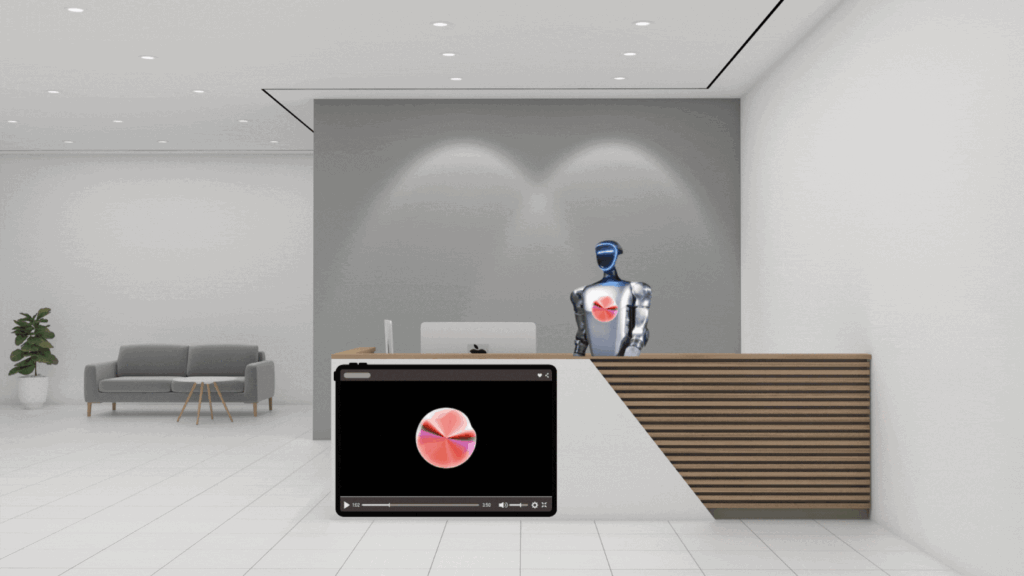Robot Care Assistant with the Humanizing® Talking Module: The Future of Interaction
At Humanizing®, we are proud to introduce the Robot Care Assistant equipped with a Talking Module, designed specifically to assist individuals with dementia. This compassionate and interactive technology can provide support, improve daily routines, and offer a sense of security and comfort to patients, caregivers, and families. By combining advanced AI with conversational capabilities, the robot acts as a virtual companion that helps manage memory loss, enhances independence, and supports a higher quality of life.


Why Choose the Robot Care Assistant with Talking Module for Dementia Support?
Companionship & Emotional Support
Dementia often leads to feelings of isolation and confusion. The Robot Care Assistant offers companionship through its Talking Module, providing comforting conversations, reminders, and emotional support, helping individuals with dementia feel more secure and less anxious.
Memory Assistance
The robot can serve as a memory aid, gently reminding patients of important tasks, appointments, medications, or personal events, such as family birthdays. This consistent support can reduce anxiety related to memory loss and enhance daily routines.
24/7 Availability
The robot is available at all times, offering a consistent, supportive presence for individuals who may feel vulnerable or disoriented. Whether it’s day or night, the robot is ready to provide assistance whenever needed.
Key Features of the Robot Care Assistant with Talking Module for Dementia Support
1. AI-Powered Conversations
With the Talking Module, the robot engages in real-time, empathetic conversations. It can ask how the person is feeling, provide positive reinforcement, and offer support when needed. Its AI allows for responsive, personalized interactions that adapt based on the needs of the individual.
2. Medication Reminders
The robot can remind individuals with dementia to take their medication at the right times, ensuring they stay on track with their prescribed treatments. It can provide gentle reminders in a calm, reassuring voice, reducing the chance of missed doses.
3. Daily Task Assistance
The robot can assist with reminders for daily tasks such as eating, dressing, exercising, or other activities of daily living (ADLs). It can help individuals create and maintain a routine, which is essential for managing dementia and improving overall well-being.
4. Personalized Interaction
The robot’s AI allows it to learn about the individual’s preferences and needs over time. It can offer personalized content, such as favorite music, stories, or videos, providing comfort and familiarity that may help reduce confusion or agitation.
5. Emotional Support & Comfort
The robot can respond to emotional cues, offering words of comfort and reassurance. It can detect signs of distress and respond with calming messages or even engage in light conversation to distract or soothe individuals, helping to alleviate anxiety.
6. Communication & Social Engagement
The robot can act as a bridge to the outside world, helping individuals stay connected with family members or caregivers. It can initiate video calls, relay messages, or share news, helping to combat loneliness and maintain social connections.
7. Integration with Health Systems
The robot can be integrated with healthcare systems, enabling caregivers and healthcare providers to monitor the individual’s progress. It can track medications, activities, and other health-related data, offering valuable insights to improve care and treatment plans.
How It Works
Gentle Greeting & Interaction: The robot greets the individual with a friendly and calming voice. It can ask how they are feeling and offer comforting words or initiate light conversation to start the day on a positive note.
Memory Aids & Reminders: The robot regularly reminds the individual about important tasks like taking medications, attending appointments, or getting ready for meals. It offers these reminders in a gentle, supportive tone, minimizing stress.
Routine Assistance: The robot can guide individuals through their daily routines, prompting them to engage in activities such as physical exercise, cognitive games, or hobbies. This helps maintain a structured routine, which is essential for people with dementia.
Emotional Support: The robot can detect signs of distress, such as anxiety or confusion, and respond with calming phrases or comforting words. It may also suggest activities or engage in positive conversations to distract from moments of agitation.
Family & Caregiver Communication: The robot can facilitate communication with family members, helping to maintain a connection between individuals with dementia and their loved ones. Video calls, messages, or updates on the individual’s health can be easily shared.
Continuous Monitoring & Feedback: The robot tracks the individual’s interactions, providing feedback to caregivers and healthcare providers. This information can be used to adjust care plans and ensure the person’s needs are being met effectively.
Applications for the Robot Care Assistant with Talking Module
1. Dementia Care Homes
In care homes, the Robot Care Assistant can be a valuable companion to individuals with dementia, offering companionship, memory support, and emotional care. It can help manage daily routines, track health data, and facilitate communication with loved ones.
2. In-Home Care
For individuals receiving in-home care, the robot can be placed in their living space to offer support throughout the day, helping to maintain routines, provide reminders, and ensure they feel connected and safe.
3. Family Caregivers
The robot can assist family caregivers by providing a reliable source of support for the individual with dementia. It can offer relief to caregivers by assisting with routine tasks, providing reassurance, and improving the overall care environment.
4. Hospitals & Rehabilitation Centers
In healthcare settings, the robot can provide continuous support to patients recovering from cognitive decline, offering daily task reminders, emotional support, and regular updates to medical teams.
Benefits for Caregivers and Families
- Reduced Caregiver Stress: By providing consistent reminders and emotional support, the robot reduces the burden on family caregivers, offering them peace of mind that their loved one is receiving the necessary assistance.
- Improved Quality of Life: The robot’s interactions help improve the overall well-being of individuals with dementia, offering companionship, reducing anxiety, and enhancing independence.
- Increased Independence: By helping individuals manage daily routines and remember important tasks, the robot enables greater independence and self-sufficiency, improving their confidence and self-esteem.
- Connected Care: The robot provides a seamless connection between caregivers, family members, and healthcare providers, ensuring everyone involved in the individual’s care is on the same page.
Request a Demo
Interested in learning how the Robot Care Assistant with Talking Module can support individuals with dementia? [Book a Demo] today and experience the comfort and benefits of this compassionate and innovative technology.
Contact Us
For more information or to discuss how the Robot Care Assistant can be integrated into dementia care programs, please reach out to us:
- Email: [email protected]
- Phone: +44 1234 567890
- Website: www.humanizing.co.uk
About Humanizing®
At Humanizing®, we specialize in humanoid robots designed to support individuals with special needs, including dementia care. Our robots are equipped with advanced AI, ensuring personalized interactions, emotional support, and seamless integration with healthcare systems. We are committed to enhancing the quality of life for both patients and caregivers through innovative technology.
Trusted By
Some of our happy clients!





